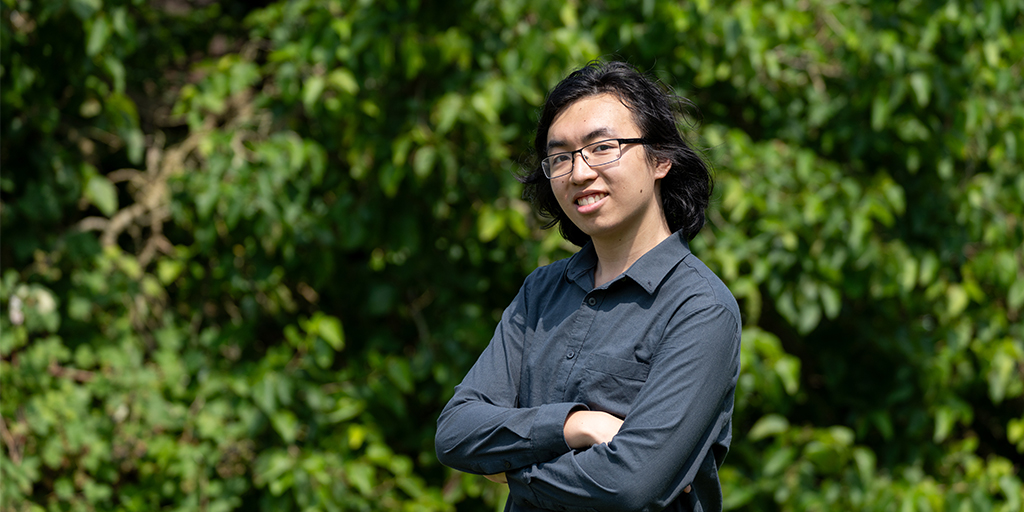
Beyond the Single Story: How Computer Games can Transform Holocaust Education
by Austin Xie, International Junior Research Associate, The University of Chicago
Austin Xie is spending two months with us here at the Landecker Digital Memory Lab as part of the University of Sussex’s International Junior Research Associates (IJRA) programme. Here, in the first of two blogs, he tells us about himself and his plans.
I’ve loved games my whole life. In elementary school, that meant the imagination games I played with friends and our own innovation of freeze tag (’freeze or tag’ — freeze everyone, or pass it on). In middle and high school, it became the video games we played and those we fantasized about designing.
So later, at the University of Chicago, it was a magical moment for me to see and take Critical Videogame Studies as part of my English major—and shortly after, cross-listing it with my newly declared second major: Media Arts and Design (MAAD), with a ‘cluster focus’ in games.
That same kind of magic manifested in my eyes during my first Zoom meeting with Dr. Victoria Grace Walden, here at University of Sussex in the Landecker Digital Memory Lab, when she said I could work with games. She noticed that ‘look’ instantly.
That magic comes from the things I study in MAAD: the idea that games can matter, that they can be serious and taken seriously, and that studying and designing them can reveal their potential for serious expression and otherwise.
My work in English supports that too. I wrote my concentration statement—which describes where our focus in the major lies—on ‘modern storytelling’, focusing on contemporary mediums and genres, like interactive fiction, film, television, genre fiction, and games, and how their forms affect how they express messages and narrative.
I’ve already done some research with new media on a project on Artificial Intelligence that mapped our imaginative capacity regarding AI, investigating the ways AI is portrayed throughout various pieces and forms of media, including scholarly literature, film, games, comics, and art.
That research, and my work here through the International Junior Research Associates (IJRA) programme, are building towards my goal of pursuing a PhD in the English/Media Studies realm, focused on storytelling and the potential of newer mediums, beyond just traditional literature.
Thus, at the Landecker Digital Memory Lab, I’ll be working on the concept of the Holocaust game, and the ethical conflicts involved with thinking about the two together. This ties in well with the work of the Lab (launching fully this Autumn), which recently published guidelines for a more sustainable approach to using computer games in Holocaust memory and education.
What can a game do that other digital memory projects cannot and what are Holocaust games struggling with?
Of course, I’ll answer fundamental questions: are Holocaust spaces ‘playable’? How does one respect history with a Holocaust game?
But aside from those critical concepts, I’ll also address a different perspective: what can a Holocaust game do for preserving Holocaust memory? What can a game do that other digital memory projects cannot? How do existing Holocaust games work, and what have they not broached yet—what are they struggling with?
I’ll be writing on that but will also develop a concrete answer: a design of a Holocaust game that offers solutions to those ethical issues, pushing into unexplored territory for the field.
In public discourse, we have these understandings of the Holocaust: the ghettos, the concentration camps, the Jews in hiding—but there is so much more that we don’t hear about – a range of experiences that typically doesn’t get represented in full.
Holocaust memory tends to focus on a single story, a single survivor, and as such, the game would strive to communicate beyond that, into the scale of the Holocaust in terms of the number of lives affected and lost, and also the scale and breadth of differing survivor experiences.
Conceptually, the game will connect and weave together stories of real Holocaust survivors and offer moments of choice. These would be points in survivor stories where two people were faced with the same decision but chose differently. The player would traverse survivor experiences in this way, following a story until they choose to diverge and thus switch their perspective to someone else, and follow that story instead.
These differing paths would form a wide, weaving tree of stories in an attempt to capture a sense of many of the paths that people trod in the Holocaust, and all the possibilities that existed outside of a ‘single story’—possible because they were, in fact, taken.
Of course, it is nigh impossible to develop a game like this, with as sensitive and important a topic as this, in the mere eight weeks I’m here. Instead, I’ll be making a proposal for this game, which would accompany some writings on games in general and games about the Holocaust in particular, all presented on an academic a poster at the end of the IJRA programme.
That proposal will detail mechanics, concepts, ethical considerations, specific survivor stories, and a small example of what the game could do, what it could be, and how it spearheads problems yet unanswered in the Holocaust game space, and perhaps Holocaust digital memory in general.
I look forward to writing it.